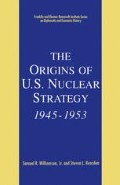Abstract
In its early stages, for the two years or so immediately following the end of World War II, the developing cold war between Washington and Moscow was essentially a contest waged by economic and political means. Clearly, as both the Truman Doctrine and the Marshall Plan signaled, the United States was increasingly dedicated to offering resistance to what it saw as the threat of communist takeovers and Soviet expansion. But whether the United States would go so far as to intervene forcibly (going beyond limited military assistance as in Greece and China) in support of this policy, possibly risking a third world war, remained to be seen. No issue thus far in the growing East-West confrontation had posed such dire possibilities.
Access this chapter
Tax calculation will be finalised at checkout
Purchases are for personal use only
Preview
Unable to display preview. Download preview PDF.
Notes
Ltr, Spaatz to Kenney, Mar. 21, 1946, quoted in J.C. Hopkins and Sheldon A. Goldberg, The Development of Strategic Air Command, 1946–1986 (Offutt AFB: Office of the Historian, HQ SAC, 1986), 2.
Kenneth W. Condit, The History of the Joint Chiefs of Staff: The Joint Chiefs of Staff and National Policy, vol. II, 1947–1949 (Washington, D.C.: Historical Div., JCS, 1976), 285–293.
For the Air Force’s view on these disputes, see John T. Greenwood, “The Emergence of the Postwar Strategic Air Force, 1945–1953,” in Alfred F. Hurley and Robert C. Ehrhart (eds.), Air Power and Warfare (Washington, D.C.: Office of Air Force History and U.S. Air Force Academy, 1979), 224–236.
For the Navy view, see David Alan Rosenberg, “American Postwar Air Doctrine and Organization: The Navy Experience,” ibid., 245–271. The best overall view of service planning during this period is Steven T. Ross, American War Plans, 1945–1950 (New York: Garland, 1988).
Diary entry, Mar. 16, 1948, in Robert H. Ferrell (ed.), Truman in the White House: The Diary of Eben A. Ayers (Columbia: University of Missouri Press, 1991), 247.
Memo, Marshall to Forrestal, Mar. 23, 1948, FRUS 1948, I, 541–542. Also see Robert Cutler, No Time for Rest (Boston: Little, Brown, 1965), 248–253.
For a detailed account of congressional action on the FY 1949 supplemental, see Edward A. Kolodziej, The Uncommon Defense and Congress: 1945–1963 (Columbus: Ohio State University Press, 1966), 74–81.
Among the extensive accounts of the Berlin blockade crisis, see especially W. Phillip Davison, The Berlin Blockade: A Study in Cold War Politics (Princeton, N.J.: Princeton University Press, 1958);
Avi Shlaim, The United States and the Berlin Blockade, 1948–1949 (Berkeley, Calif.: University of California Press, 1983);
and Daniel F. Harrington, “American Policy in the Berlin Crisis, 1948–1949,” (Ph.D. diss., Indiana University, 1979).
DEFE 4/14, Mins., C.O.S. (48), 96th Mtg Chiefs of Staff Committee, July 9, 1948; and 99th Mtg, July 14, 1948, Public Record Office, London (Kew). Also see Avi Shlaim, “Britain, the Berlin Blockade and the Cold War,” International Affairs (London) 60 (Winter 1983/4): 8–9.
CAS memo, Sep. 24, 1948, quoted in Ian Clark and Nicholas J. Wheeler, The British Origins of Nuclear Strategy, 1945–1955 (Oxford: Clarendon Press, 1989), 129.
Robert H. Ferrell (ed.), Off the Record: The Private Papers of Harry S. Truman (New York: Harper and Row, 1980), 148–149.
For the internal debates over the budget, see Rearden, Formative Years, 343–347; K. Condit, JCS and National Policy, 1947–1949, 232–250; and Warner R. Schilling, “The Politics of National Defense: Fiscal 1950,” in Warner F. Schilling, Paul Y. Hammond, and Glenn H. Snyder, Strategy, Politics, and Defense Budgets (New York: Columbia University Press, 1962), 135–213.
Memo, Truman to Webb, Dec. 2, 1948, PSF, Truman Papers. For an excellent account of the 1948 election campaign and the confidence that winning fostered in Truman’s outlook, see David McCullough, Truman (New York: Simon and Schuster, 1992), 653–719.
Author information
Authors and Affiliations
Copyright information
© 1993 Samuel R. Williamson, Jr. and Steven L. Rearden
About this chapter
Cite this chapter
Williamson, S.R., Rearden, S.L. (1993). 1948: Year of Crisis. In: The Origins of U.S. Nuclear Strategy, 1945–1953. Franklin and Eleanor Roosevelt Institute Series on Diplomatic and Economic History. Palgrave Macmillan, New York. https://doi.org/10.1007/978-1-137-05882-9_4
Download citation
DOI: https://doi.org/10.1007/978-1-137-05882-9_4
Publisher Name: Palgrave Macmillan, New York
Print ISBN: 978-1-349-60676-4
Online ISBN: 978-1-137-05882-9
eBook Packages: Palgrave Political & Intern. Studies CollectionPolitical Science and International Studies (R0)

